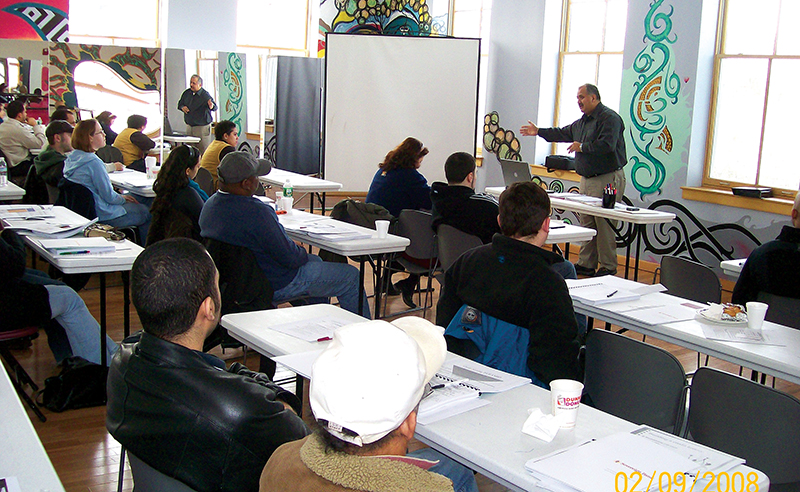For first-time homebuyers unsure of how to approach the daunting journey from dream to down payment and beyond, Lawrence Community Works (LCW) has a solution. In an 11-hour seminar, home ownership counselor Iris Matias helps potential buyers learn the ropes. “We help them navigate the whole process,” says Matias. “We connect them with the resources we have in the community.” A former mortgage broker, Matias has a double-sided perspective, which is helpful when it comes to educating new buyers. She introduces participants to topics like financial literacy, mortgage readiness, anti-predatory lending, and consumer protection.
As one of LCW’s Family Asset Building initiatives, the $50 Homeownership Education Seminar exposes first-time buyers to the industry and the people who manage it. Lenders, home inspectors, insurance agents, realtors, and real estate attorneys, as well as representatives from affordable housing and down payment assistance programs, serve as volunteer guest speakers in Matias’s class. The program is effective, in part, because potential buyers can ask questions without pressure. “[The speakers] understand they are coming here to educate, not to sell products,” explains deputy director Juan Bonilla. Clients learn how best to work with the many different professionals who oversee the home buying process.
Other teaching tools include a manual based on one used by the Massachusetts Homeownership Collaborative, administered by the Citizens Housing and Planning Association (CHAPA). As a member of the collaborative, LCW must abide by the standards it sets. There is a base curriculum, but they have the freedom to modify things for their demographic. “Sometimes, when folks come in, it’s incredible the amount of information they lack. Even people who have done research are missing a lot of information,” says Bonilla, who stresses education as the key to long-term success as a homeowner. “That is what we strive to do—to empower people and equip them with good information.”
The Homeownership Center services the whole state but primarily works with people in the Lawrence, Haverhill, Lowell, and Methuen communities. The bulk of participants are working families, though there are some low-income individuals who turn to resources like Habitat for Humanity. A diverse mix of people come for the information—some have an impending closing and are being referred by a lender, while others are just curious. “We help them understand their options,” says Bonilla. “The home buying process is not simple. It requires many steps, and it’s easy for consumers to make mistakes if they are not properly informed and prepared.”
Matias is responsible for coordinating the six classes that comprise the seminar—taught in both Spanish and English, alternately—and for arranging guest speakers. She discusses not only ways to buy a home but also how to manage and keep it. “Things change, your budget changes,” says Matias, who notes the differences between renting and owning. “Taxes, maintenance costs—these are things, as a tenant, you don’t think about.” Consequently, she places great emphasis on budgeting. “The budget piece is critical,” notes Matias. “People need to realize it’s more than a dream; they have to work at it.”
|
The classes provide a broad overview of the home buying process, but it is by combining them with unlimited counseling sessions that the program has been made so effective. “It isn’t a cookie-cutter approach,” explains Bonilla. “We tailor the information to the client’s goals.” To prepare first-time buyers, Matias walks them through the ins and outs of things like credit scores and mortgage analyses. “I always say to clients who come to me, ‘I am buying a house with you. I’m holding your hand and we are going to start from zero [and work] until you close on your property.’” For some, it is an extremely complicated process. For others, less so— depending on their finances and money management skills. Clients may seek Matias’s guidance for a matter of months; others may work with her for a few years.
Participants also receive help deciding what kind of property is right for them—single versus multifamily homes. A landlord training class is available for multi-family homebuyers. Many lower-income families look at this option as a way into home ownership. “They need to understand that even though the rental income is helpful, it does come with added responsibility,” says Bonilla. Other considerations include security, neighborhood, and community engagement, he explains. “It is a very rich curriculum and program. People get hit with a lot of information.”
Post-purchase, clients are invited to attend Home Safe workshops, offered six times throughout the year. Refinancing, condominium ownership, wealth accumulation, long-term financial planning, basic maintenance, energy efficiency, and foreclosure intervention are some of the topics covered.
Though they see some failed attempts at homeownership, far greater are the happy outcomes. “We have so many success stories,” notes Matias, who gives the example of a client who recently bought a condo for $90,000 through the Bread and Roses program. She is now paying less on her mortgage than she was for rent. Matias worked with her for over two years while she saved money for a down payment. Success, however, comes in more than one form. “When somebody chooses not to buy, that is also a success story for us,” notes Bonilla. “We congratulate people when they make that choice because we know it was a very difficult decision to make.” People must be ready, both financially and psychologically, to buy. If, after counseling, they deem themselves ill prepared, then it is better that they hold off than dig themselves into a hole.
LCW’s homeownership programming is not about steering people in a direction. It presents options and explores consequences. “This is a good place for people to come,” says Bonilla. “They get good, thorough information and guidance that is unbiased. Ultimately, the responsibility is theirs and the ownership has to be theirs, too.” lawrencecommunityworks.com


 The home ownership seminar is a series of six classes held at LCW
The home ownership seminar is a series of six classes held at LCW